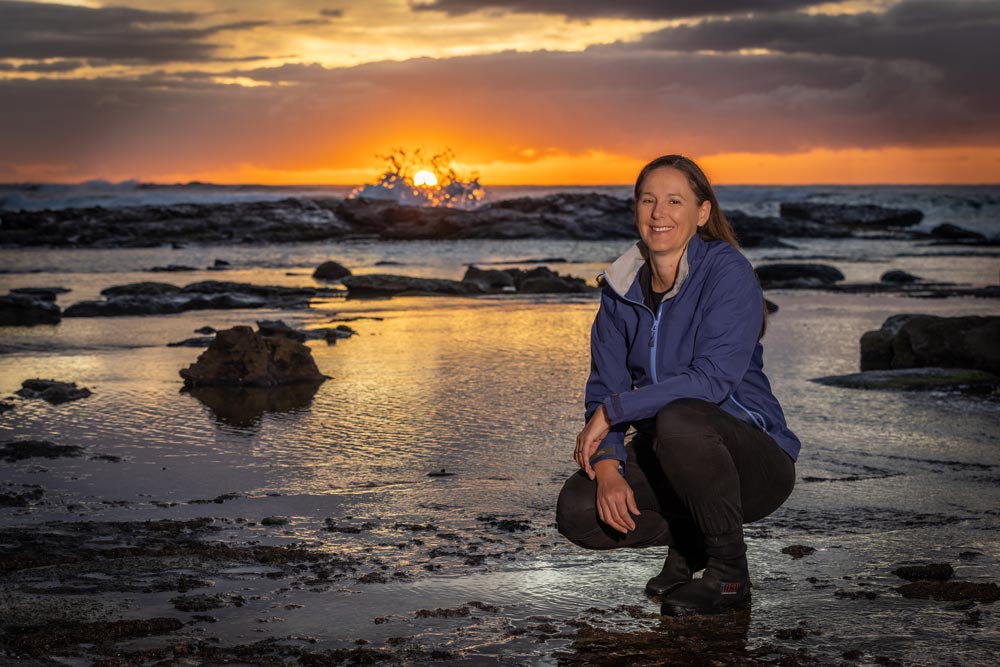Researcher Highlights
Studying marine microbes to protect the planet
Ocean enthusiast, Dr Megan Huggett’s work is all about understanding the impact of climate change, pollutants and contaminants on marine ecosystems. Her focus is on microbes – the nearly invisible universe at the bottom of the ocean.

“Everything about the ocean excites and interests me,” says Megan. “The colours, the movement, the remoteness, the dangers, and most of all the living creatures that inhabit it.”
She’s interested particularly in understanding the ocean’s tiniest living inhabitants – microorganisms. They underpin the biogeochemical cycles of this planet and facilitate the health and wellbeing of the larger organisms they inhabit.
Megan’s career has spanned Australia and the US, and she has worked in five different institutions in the past two decades for her PhD, post-docs and now as a permanent academic at the University of Newcastle.
“Through my research, I’ve discovered that while the microbes of fish play a key role in the health of their host, this community is disrupted by impacts such as the history of coral bleaching, inputs of sewage, and legacy contamination by heavy metals,” she says.
She’s also found that climate-induced warming causes fish microbial communities to lose species richness and become dominated by pathogens.
Practical impacts of microbial profiling
To translate her research into actual impact, Megan works with local councils, Hunter Water, and state government agencies, such as the Department of Planning and Environment in NSW and The Department of Biodiversity, Conservation and Attractions in WA, around the impacts of water quality and stormwater.
A very practical outcome of her water quality research is to help managers understand the types of contaminants in local estuaries and the length of time they may stay in the environment.
Her work has been important in helping councils to understand the sources of nutrient inputs into waterways.
She also has international collaborators in the US, Japan and Spain on fundamental research questions about the microbial ecology of marine ecosystems to deliver globally relevant scientific outcomes.
“My research delivers globally relevant information regarding the impacts of climate change to marine ecosystems, with particular emphasis on how microbial communities will respond to future warming and other anthropogenic impacts such as metal contamination, ocean acidification and eutrophication,” says Megan.
The next project: microbes and ocean probiotics
Her national and global collaborations will continue to grow and develop despite the physical location of her office and by continuing to establish local connections within each community where she’s worked.
In the next five years, Megan plans to develop techniques to culture key marine microorganisms to understand their functional capacity and to test and predict how they’re likely to respond to environmental change.
“This will also enable me to test if some of them can be used as probiotics to help to maintain or re-establish the balance of an organism’s health, even under future environmental changes,” says Megan.
The intended outcome is to ensure the health of not only microbes but all organisms on Earth that they’re intricately linked with, relying on them for functions such as nutrition, resilience to environmental change and resistance to disease.
Training tomorrow’s marine scientists
To date, Megan has co-authored 36 journal outputs and two conference papers.
During her time as senior lecturer of the School of Environmental and Life Sciences at the University of Newcastle, she has so far secured grants and funding of $447,151 from various sources to support her living plant-protecting work.
Some of the most recent 2022/21cash injections have come from Hunter Water Corporation, The Central Coast Council, OzFish, Lake Macquarie City Council, the University of Newcastle - Research and Innovation Division, and NSW National Parks & Wildlife Service.
Megan’s goal is to deliver useful, original outcomes for the health of marine ecosystems nationally and globally via research and training the next generation of marine scientists.
“I am delighted when I see my students do well, gain confidence, publish their research in high-quality journals and grow into critical-thinking individuals who can contribute to a range of environmental issues at local, state and international levels,” says Megan.
The University of Newcastle acknowledges the traditional custodians of the lands within our footprint areas: Awabakal, Darkinjung, Biripai, Worimi, Wonnarua, and Eora Nations. We also pay respect to the wisdom of our Elders past and present.